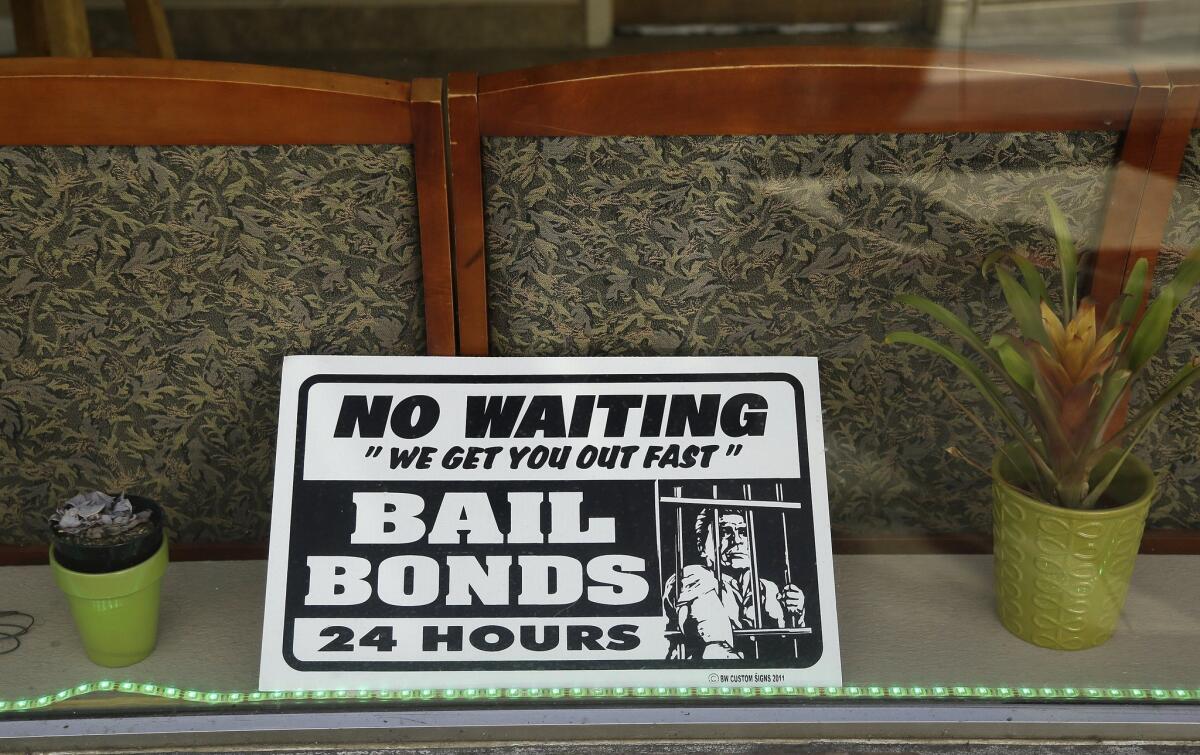Capitol Journal: Our current bail system is indefensible, but the bill that aims to fix it needs work

- Share via
Reporting from In Sacramento — If you’re rich and get arrested, you’ll probably waltz out of jail after writing a big check. If you’re broke, it’s likely you’ll be locked up.
Is that fair? Emblematic of the American Way, at least as we like to think of it? Of course not.
But it’s how the bail bond system works in California and most states. It’s based more on the size of your bank account than on your probable guilt or innocence, or your risk of bolting town and skipping trial.
Hardly anyone defends the current system. Well, maybe the bail bond agents who make their living off this unjust system. But even they agree it should be changed.
But changed precisely how?
The Legislature has been arguing over that for months.
“We need a system that makes sure everyone arrested is treated the same, regardless of background or income level,” says state Sen. Bob Hertzberg (D-Van Nuys), author of the lone bail reform bill still alive in the Legislature.
“The present bail system punishes the poor for being poor,” contends Assemblyman Rob Bonta (D-Alameda), whose similar bill was killed by the Assembly on June 1. Bonta is helping Hertzberg push his bill.
Pushing back are prosecutors, law enforcement, the judiciary and bail bondsmen.
The legislation would “cost hundreds of millions of dollars and cause the mass release of defendants into our communities,” claims the Golden State Bail Agents Assn.
Hertzberg’s bill, SB 10, would scrub the old bail system and attempt to ensure that suspects awaiting trial are not jailed solely because they can’t afford bail.
Counties would be required to establish a “pretrial services” agency tasked with developing a “risk-assessment” procedure to assess a suspect’s threat to the community and likelihood of fleeing. Defendants generally considered non-threatening and who are not flight risks would be freed awaiting trial, probably without bail. Although judges still could require it based on a suspect’s ability to pay.
The bill was approved Tuesday on a 4-2 vote — Democrats for, Republicans against — by the Assembly Public Safety Committee and sent to the Assembly Appropriations Committee.
Unfortunately, this action followed an increasing legislative trend: Committees — even houses — scooting bills along before they’re fully cooked.
Half-baked bills get social promotions like unprepared schoolchildren being moved up a class before they’re ready. Like some teachers, many legislators — mostly Democrats in Sacramento — have a problem just saying no.
That’s mainly due to traditional “go along to get along” political schmoozing. All lawmakers have their own bills they’re shepherding and try not to make enemies by voting against a colleague’s measure.
There’s also party unity to a fault, with legislators voting the party line rather than thinking independently. That’s a curse of partisan politics.
Moreover, there are way too many bills — hundreds of frivolous measures — that waste legislative time and leave less opportunity for critical thinking and planning.
And there are artificial deadlines that lawmakers strive to meet though they’re essentially meaningless. If legislative leaders want, the deadlines can be waived anyway.
So over the years, substantive legislative committee work has dissipated, if not vanished. Rather than a policy committee taking months or a couple of years to write a comprehensive bill with workable details and solid funding, it quickly kicks the can down the road.
The most ludicrous example this year was the Senate’s passage of a so-called single-payer healthcare bill. It didn’t contain details on healthcare delivery, cost controls or the astronomical funding.
To his credit, Assembly Speaker Anthony Rendon (D-Paramount) sent the bill back to the Senate with an admonition to fix it.
The bail bill is much more responsible. But there was a loud complaint about its alleged impracticality during the committee hearing by an opponent from the Los Angeles County district attorney’s office.
“Stop right now, pause and get it right,” Deputy Dist. Atty. Elizabeth Ratinoff urged the committee.
Ratinoff called the bill “unworkable” and said the committee should take its time to analyze and compromise. After all, she said, it’s a two-year legislative session that won’t end until September 2018.
But 2018 will be an election year, when controversial bills are even harder to pass, Hertzberg and Democrats realize.
Beyond that, there’s a suspicion that the heavy bashing of President Trump by California Democrats will result in his cutting off substantial federal funds to Sacramento next year. And, anyway, we’re about due for another economic downturn.
So Hertzberg and Democrats believe the window is open now for major legislation costing money. Hertzberg wants to get his bill passed by Sept. 15, when this year’s session ends.
One supporter, however, said she’s concerned about the high cost of pretrial services and risk-assessment procedures. A committee analyst estimated it at hundreds of millions of dollars.
“I’m really worried about where this bill is at this point,” said Assemblywoman Lorena Gonzalez Fletcher (D-San Diego). “I just don’t see how without spending a lot of money — a lot of money — on this bill that it works.”
She’s chairwoman of the Appropriations Committee, the bill’s next hurdle.
Gov. Jerry Brown also is worried about the bill’s cost, an insider says, but he’s all for the concept of not locking up suspects merely because they’re paupers.
A concept is not a comprehensive plan, however. Hertzberg is amending his bill as it moves along, searching for compromise.
Hopefully he’ll find the sweet spot — this year or next. Our current bail system is indefensible.
Follow @LATimesSkelton on Twitter
ALSO
Bored by state races, young Californians increasingly forsake their right to vote
More to Read
Get the L.A. Times Politics newsletter
Deeply reported insights into legislation, politics and policy from Sacramento, Washington and beyond. In your inbox twice per week.
You may occasionally receive promotional content from the Los Angeles Times.











